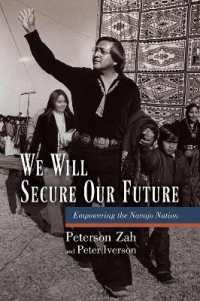- ホーム
- > 洋書
- > 英文書
- > Science / Mathematics
Full Description
The language of science has many words and phrases whose meaning either changes in differing contexts or alters to reflect developments in a given discipline. This book presents the authors' theories on using 'conceptual profiles' to make the teaching of context-dependent meanings more effective. Developed over two decades, their theory begins with a recognition of the coexistence in the students' discourse of those alternative meanings, even in the case of scientific concepts such as molecule, where the dissonance between the classical and modern views of the same phenomenon is an accepted norm. What began as an alternative model of conceptual change has evolved to incorporate a sociocultural approach, by drawing on ideas such as situated cognition and Vygotsky's influential concept of culturally located learning. Also informed by pragmatist philosophy, the approach has grown into a well-rounded theory of teaching and learning scientific concepts. The authors have taken the opportunity in this book to develop their ideas further, anticipate and respond to criticisms—that of relativism, for example—and explain how their theory can be applied to analyze the teaching of core concepts in science such as heat and temperature, life and biological adaptation. They also report on the implementation of a research program that correlates the responsiveness of their methodology to all the main developments in the field of science education. This additional material will inform academic discussion, review, and further enhancement of their theory and research model.
Contents
INTRODUCTION.- SECTION 1 The conceptual profile: theoretical, epistemological and methodological bases of a research program.- CHAPTER 1 Conceptual Profiles: Theoretical-Methodological Bases of a Research Program.- CHAPTER 2 The Epistemological Grounds of the Conceptual Profile Theory.- CHAPTER 3 Methodological grounds of the conceptual profile research program.- SECTION 2 Empirical studies for building and using conceptual profile models for chemical, physical and biological onto concepts.- CHAPTER 4 Contributions of the sociocultural domain to define a conceptual profile for molecule and molecular structure.- CHAPTER 5 Building a Profile for the Biological Concept of Life.- CHAPTER 6 Investigating the Evolution of Conceptual Profiles of Life amongst University Students of Biology and Pharmacy: The Use Statistical Tools to Analyze the Answers of Questionnaires.- CHAPTER 7 Conceptual profile of adaptation: a tool to investigate evolution learning in biology classrooms.- CHAPTER 8 A conceptual profile of entropy and spontaneity: characterizing modes of thinking and ways of speaking in the classroom.- CHAPTER 9 The Implications of Conceptual Profile in the Teaching of Science: an example from a teaching sequence in thermal physics.- SECTION 3 Recent developments in the research program.- CHAPTER 10 Conceptual Profile as a Model of a Complex World.- CHAPTER 11 Building a profile model for the concept of Death.








